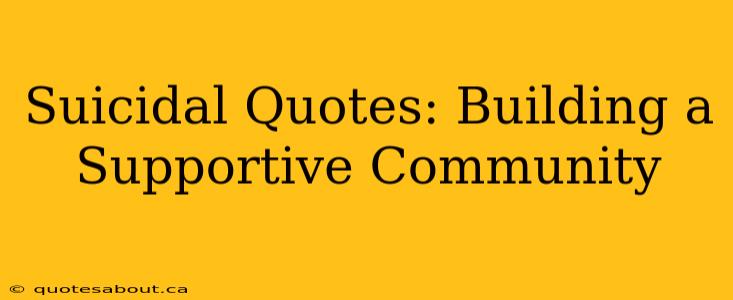Suicidal Quotes: Building a Supportive Community
Suicidal thoughts are a serious issue affecting millions worldwide. While analyzing quotes related to suicide might seem insensitive, understanding the language and emotional landscape surrounding suicidal ideation can be crucial in building a supportive and understanding community. This isn't about glorifying suicide; it's about recognizing the pain behind the words and using that knowledge to offer effective help. We'll explore the complexities of suicidal quotes, examining how they reflect underlying struggles and how we can respond compassionately and constructively.
What do suicidal quotes typically express?
Suicidal quotes often express feelings of hopelessness, isolation, unbearable pain, and a perceived lack of options. They can manifest as cries for help, veiled expressions of despair, or even seemingly detached observations reflecting a deep sense of disconnect from life. Understanding the nuances of these expressions is vital in recognizing and responding to someone who might be struggling. The language may vary significantly depending on the individual's background, mental health condition, and the specific circumstances they are facing.
Are there certain phrases or words that indicate suicidal ideation?
While there's no single magic phrase that definitively indicates suicidal thoughts, certain words and phrases should raise red flags. These might include direct statements about wanting to die or end their life, expressions of feeling hopeless or worthless, and references to self-harm or suicide methods. Indirect cues can be just as important, such as expressions of overwhelming fatigue, unbearable pain (physical or emotional), and a persistent sense of being trapped or burdened. It’s important to pay attention to the overall context and tone, as well as the individual's behavior and body language.
How can I respond if someone shares a suicidal quote or expresses suicidal thoughts?
Responding to someone who shares a suicidal quote or expresses suicidal thoughts requires sensitivity, empathy, and immediate action. Avoid judgmental or dismissive responses. Instead, validate their feelings by acknowledging their pain and letting them know you care. Listen actively without interruption, showing genuine concern and understanding. Encourage them to seek professional help by suggesting they contact a crisis hotline, mental health professional, or a trusted friend or family member. Remember, your role is to listen, offer support, and guide them towards professional assistance; you are not responsible for curing them.
What resources are available for people experiencing suicidal thoughts?
Numerous resources are available for individuals experiencing suicidal thoughts and for those who want to support them. These include crisis hotlines, online support groups, and mental health organizations offering counseling and therapy. The National Suicide Prevention Lifeline (988 in the US) provides 24/7 confidential support. The Crisis Text Line (text HOME to 741741) offers similar services through text messaging. Many online platforms also provide resources and support communities dedicated to mental health. It's crucial to emphasize that seeking professional help is a sign of strength, not weakness.
How can we create a more supportive community for those with suicidal thoughts?
Building a supportive community requires open conversations about mental health, reducing stigma, and promoting help-seeking behaviors. Educating ourselves and others about suicide prevention, recognizing warning signs, and responding appropriately are vital steps. Creating safe spaces where individuals feel comfortable sharing their struggles without fear of judgment is essential. Encouraging empathy, understanding, and compassion can make a significant difference in saving lives. Remember, even a small act of kindness can have a profound impact.
Disclaimer: This information is for educational purposes only and should not be considered medical advice. If you or someone you know is struggling with suicidal thoughts, please seek professional help immediately. Contact a crisis hotline or mental health professional for support.

